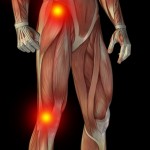
Some of the Elf’s older friends have started to develop osteoarthritis (OA) in their hips and knees and have been asking the Elf about it. Here are some of their questions. Would exercise strengthen their muscles? Would stronger muscles help them in their everyday activities?
The authors of a recent systematic review evaluated the effect of current rehabilitation programs for improving muscle strength in people with hip or knee OA. Let’s see what they found.
Here’s what they did
The authors searched seven databases (up to Feb 2013) for randomized controlled trials evaluating lower limb strength outcomes of exercise-based interventions for participants with hip or knee OA using voluntary contractions with a minimum duration of 6 weeks. Quality of evidence was assessed using Grading of Recommendation, Assessment, Development and Evaluation approach.
Here’s what they found
- Forty RCTs were included – 39 for OA knee and only 1 for OA hip
- 77% involved resistance based exercise programs compared wth control
- Low-intensity resistance programmes at short term (ST) follow-up – high quality evidence
- improved knee extension strength (SMD 0.47, 95% CI 0.29 to 0.66)
- improved flexion strength (SMD 0.74, 95% CI 0.56 to 0.92)
- these effects were not sustained in the intermediate or long term
- High-intensity resistance programmes at short term follow up – moderate quality evidence
- large effect for knee flexion and extension strength (SMD = 0.76, 95% CI 0.47, 1.06).
- this effect was sustained at intermediate term follow-up (SMD = 0.80, 95% CI 0.44, 1.17).
- Few studies reported on outcomes at long term follow-up
The authors concluded
When compared to a control group, high-intensity resistance exercise demonstrated moderate quality of evidence for large and sustained improvements for knee muscle strength in knee OA patients.
The Musculoskeletal Elf’s view

This review opens up a number of issues. Firstly it is very interesting to note that OA hip receives very little attention in the literature compared with OA knee. From the reports of the studies included in this review it appears that the severity of OA was not quantified. This could have important implications on the data obtained and conclusions drawn from these studies. Perhaps a stratified selection process could be employed in future studies with an a priori subgroup analysis for severity of OA.
Furthermore these studies focussed on strength outcomes alone. It would perhpas be more useful for people with OA if these studies examined the effects of strength training on functional outcomes.
What do you think?
- Are strength outcomes approriate or should the focus be on function?
- Do you think severity of OA should be recorded and accounted for in analysisof these types of studies?
Send us your views on this blog and become part of the ever expanding Musculoskeletal Elf community. Post your comment below, or get in touch via social media (Facebook, Twitter, LinkedIn, Google+).
Links
- Efficacy of rehabilitation programs for improving muscle strength in people with hip or knee osteoarthritis: a systematic review with meta-analysis. Zacharias A, et al Osteoarthritis Cartilage. 2014 Nov;22(11):1752-73. doi: 10.1016/j.joca.2014.07.005. Epub 2014 Jul 24.

Is resistance training beneficial for people with hip or knee osteoarthritis? http://t.co/rKhwEzp8sy
Strength is an important outcome with any resistance program, but it would’ve been helpful to include functional outcomes and subjective pain ratings throughout the course of the program. Pain plays an equally significant role in function alongside strength.
RT @MSK_Elf: Is #exercise beneficial for people with #hip or #knee #osteoarthritis http://t.co/UwNLOXQtU7 @theCSP @physioMACP
RT @SportsInjurySco: http://t.co/3phPWXjQmY http://t.co/Khg48xHGAN
RT @ProfTraceyHowe: Q: what’s important #exercise benefit people #osteoarthritis – #strength or #function http://t.co/f1DOubOy7a @Arthritis…
Q: have #hip #knee #osteoarthritis is #exercise beneficial? http://t.co/UwNLOXQtU7 @PTHSN @ArthritisUpdate
Q: is #exercise beneficial #hip #knee #osteoarthritis ? http://t.co/f1DOubOy7a @Physiowizz @PhysioTalk
New blog #exercise for #hip #knee #osteoarthritis http://t.co/f1DOubOy7a @thecspstudent
Interesting questions.
I will answer a definitive yes to the question of function: at the end, that’s what matters to the patients!
Severity of OA: that’s an interesting suggestion a probably a good one. I think it is perfectly feasible that the balance of benefits and harms of exercise could be much different in patients with different degrees of OA. So I will go with a cautious yes (don’t throw away the studies who do not report about that!)
Q: have #hip #knee #osteoarthritis is #exercise beneficial? http://t.co/f1DOubOy7a @arthritisdigest @arthritisFdn
RT @MSK_Elf: New blog #exercise for #hip #knee #osteoarthritis http://t.co/vVRbjayURx
Very interesting! This is very relevant for many of the older adults who participate in our Balance for Life… http://t.co/7Q8tdGGkUg
@MSK_Elf @ArthritisDigest @ArthritisFdn